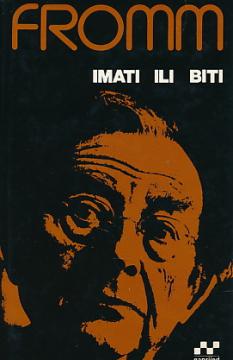
Imati ili biti?
Im Angebot sind keine Exemplare vorhanden
Das letzte Exemplar wurde kürzlich verkauft.

Im Angebot sind keine Exemplare vorhanden
Das letzte Exemplar wurde kürzlich verkauft.
Interessieren Sie sich für ein anderes Buch? Sie können das Angebot über unsere Suchmaschine suchen und finden oder Bücher nach Kategorien durchsuchen.
In dem Buch übt Fromm scharfe Kritik an der zeitgenössischen Psychoanalyse. Er glaubt, dass sich die Psychoanalyse von Freuds ursprünglicher revolutionärer Vision entfernt und sich in ein technisches, oft steriles System verwandelt hat, das tiefere mensch
In dem Buch „Die gesunde Gesellschaft“ geht Erich Fromm der Frage nach, was eine Gesellschaft psychisch gesund und was sie krank macht. Das Buch stellt die Krönung von Fromms Sozial- und Politikphilosophie dar, in der er das sogenannte bevorzugt. humaner,
In „Lob der Torheit“ betrachtet Erasmus den ganzen Unsinn seiner Zeit unter der Lupe und kritisiert dabei die antiken Autoren selbst. Illustrationen von Hans Holbein dem Jüngeren aus der Basler Ausgabe von 1676. Vorwort von Veljko Korać.
Slobodan Žunjić untersucht in seinem Buch „Martin Heidegger und der Nationalsozialismus“ (1992) ausführlich den Zusammenhang zwischen Martin Heideggers Philosophie und seiner Beteiligung am Nazi-Regime.
Diese Arbeit befasst sich mit den Themen Klassenkampf und unterschiedlichen Vorstellungen von sozialer und wirtschaftlicher Entwicklung und bietet Einblicke in für die damalige Zeit relevante soziologische und wirtschaftliche Theorien.